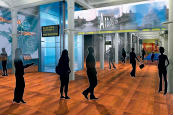With the price of an average round-trip to Europe by budget airline coming in at less than a family shopping trip to Tesco, flying has understandably overshadowed rail travel in recent years.
However, all that may be about to change. Not only has the aviation industry been hit by the carbon-impact debate, but the opening of four high-speed rail lines across Europe will undoubtedly encourage consumers to reconsider using the train.
The Railteam Alliance, a coalition between Europe's leading high-speed rail operators, including Eurostar, is aiming to hasten this shift in consumer behaviour by making inter-city rail travel across Europe simpler and cheaper (Marketing, 4 July).
The alliance is investing £20m in a distribution system, that, from 2009, will offer combined-ticket prices and the facility to buy from any member ticket office. These improvements will overcome the main difficulties rail travellers face when purchasing tickets via individual rail websites, such as the different languages and formats involved, as well as the inevitable fallback to travel agents, which tend not to offer the lowest fares.
Other changes under the partnership will include allowing passengers who miss a connection because of late-running services to take the next train, regardless of ticket type, while frequent travellers will benefit from a 'train miles' scheme and access to more than 30 business lounges across Europe.
The European network will also benefit domestic train operators. From 14 November, Virgin Trains passengers will be able to book better-priced combination tickets through Eurostar booking offices, as the cross-Channel service moves to its new London terminal at St Pancras. Eurostar is also talking to other UK rail companies about plans to extend through-fares to the Continent.
'Journeys from the Midlands and South to Europe will be able to compete with air travel on time because of easier connections at St Pancras,' says Virgin Trains sales and marketing director Craig Inglis.
Travel times from St Pancras will be cut by at least 20 minutes, with the London to Paris trip taking two-and-a-quarter hours. The opening of a further Eurostar station, Ebbsfleet International in Kent, soon after will reduce times by a further 20 minutes.
Railteam is confident of success, predicting that the growth of high-speed train travel will have an impact on short-haul air travel. 'People are waking up to the idea of real time,' says Eurostar marketing director Greg Nugent. 'When you consider check-in times and the possibility of flight delays, rail is an attractive alternative on many short-haul routes.'
The shift is set to affect a range of consumers. According to Eurostar, business travellers are willing to travel up to four hours by rail because of the time it allows them to work, while leisure travellers are prepared to sit through longer journeys of about six hours.
Nugent believes environmental concerns will also play a big part in consumers choosing rail over air travel. 'People are asking more questions about their carbon footprint and rail is greener,' he says. According to Eurostar, rail travel generates 10 times less CO2 than flying. It also plans to offer carbon-neutral journeys from November and cut the emissions generated by each traveller journey by 25% by 2012.
The aviation industry claims to be unfazed by these developments. 'We don't try to compete with rail travel if the trip takes less than three hours,' says Toby Nichol, communications director at easyJet. 'However, longer than four hours and the plane wins every time.'
He challenges rail's proposition on the grounds of convenience. 'It's easy to put dots on maps, but changing is a hassle, and why would you take two trains when you can take a single plane?'
Nichol also questions the rail industry's green credentials. 'Rail goes only on [the train's] tailpipe emissions, which conveniently ignores that the power has to be generated in the first place, so it's not a very green alternative.'
Some travel experts suggest high fares will be another drawback. Eurostar's Nugent admits that there won't be a dramatic drop in prices, but argues that value is becoming more important than cost. 'There will always be a segment of travellers who want the lowest fares, but it's shrinking,' he says. 'I see rail travel becoming a mass transit, not just a luxury.'
The alliance could easily be dismissed as a marketing exercise designed to mirror the tie-ups formed between international airlines, but Clement Wong, travel and tourism research manager at Euromonitor, believes it will benefit an industry that has not been known for its communications. 'The marketing of rail travel is poor at present and international travellers remain unaware of the benefits of high-speed rail,' he says. 'We're likely to see more communications now.'
Eurostar's immediate marketing will focus on the benefits of the alliance and high-speed train travel. It will place greater focus on European connections from next year, when it also plans to run a joint marketing campaign with Virgin Trains. Railteam members are also set to synchronise their advertising with key messages and umbrella branding.
With plans afoot for High Speed Two, a line that will connect London St Pancras to Birmingham, the cost/convenience/ethics debate between air and rail travel is likely to continue. The challenge for Eurostar and its Railteam partners will be convincing travellers to pay a premium on environmental grounds.


